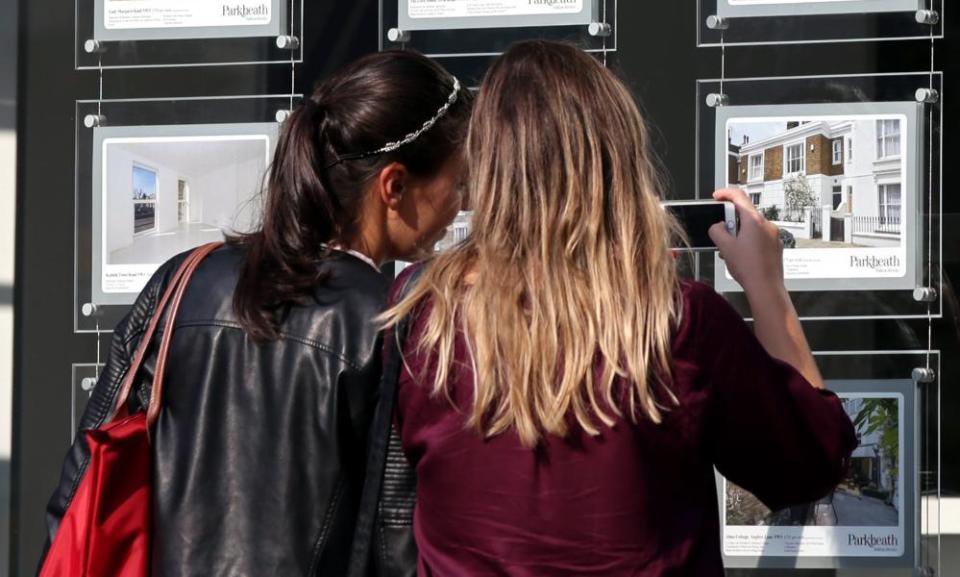Right to buy exposes the cynicism of a Tory party whose base is dying out

Almost a year ago, in panel after panel at the Conservative party conference, audience members and politicians alike expressed both fear and frustration. Fear of Jeremy Corbyn’s popularity among voters under 45, and frustration that when it came to one of the biggest drivers of support for him – the housing crisis – the Tories had no new ideas.
One clear predictor of voting intention is your housing tenure, with most private and social renters backing Labour in last year’s general election. Meanwhile, the number of renters is growing as house prices continue to stand at eye-watering heights – even if there have been small decreases recently.
Housing tenure can be affected by government policy. Margaret Thatcher, in the 1980s, announced plans to turn Britain into a nation of homeowners, greatly expanding the right to buy council houses – knowing that homeowners by and large vote blue. With far less of this stock now available, the Conservative government, continuing a policy first mooted by David Cameron and George Osborne, are left with housing association property to sell off. As ever, we are fed empty promises that affordable homes will be built to replace those sold, but this has never reached one-for-one levels with the sale of council stock.
Right to buy isn’t a heartfelt attempt to get people on to the housing ladder: it’s a move to shift people from a tenancy more secure than most private rentals into the market, selling off housing association assets at a huge discount. A home can recoup rent for a housing association or council for as long as it stands, with the money being reinvested into housebuilding and local services. Once you sell one of these homes, it’s gone for ever: this is a huge false economy, and ultimately takes property that is desperately needed for low-cost housing out of that market.
And then what happens? Of the homes sold under right to buy, 40% are now rented out privately. Many of these tenants will still receive housing benefit, meaning that a socially rented home has been flogged at a discount, and is then in turn rented at a far higher price, while still costing the state money.
The move is deeply cynical, and reveals the hatred the Conservatives harbour towards social housing. The bedroom tax turfed people, many of them disabled, out of their homes, while the government disseminated myths about people living it up in council houses the size of small mansions. Then, after complaining about a shortage of social housing, arguing it must only go to the most destitute, the Conservatives push ahead with a fire sale of housing association homes, starting with a pilot scheme involving 70 local authorities in the Midlands.
The plan is clearly to further plunder the UK’s dwindling social housing stock until municipal accommodation is a distant memory, and in the process, they hope, create the next generation of homeowning Conservative voters. There is no sound economic basis for such a policy, and the ethical or moral reasons put forward for pursuing it simply do not stand up to scrutiny. This is a naked attempt to buy votes, and the fact it has been tried before shows how truly bereft of ideas the Conservatives are.
For years now they have been doomed to desperately try to repeat the policies Thatcher mooted in the 1980s, all the while discovering how far their heroine went in ransacking the state. To paraphrase the Iron Lady: the trouble with Thatcherism is eventually you run out of other people’s assets.
But the move to right to buy may not work as intended, and could even backfire. On paper, right to buy looks like a great deal for buyers – until many find they simply can’t keep up with mortgage payments, even with a large initial discount: the cost of food and fuel keeps rising and is drastically outstripping wages.
Equally, the link between home ownership and voting Tory looks more fragile than ever: an Ipsos Mori poll on the 2017 election found Labour had increased its vote with mortgage holders by 8%, and the gap between overall voting patterns in this group is narrowing: 43% voted Conservative, 40% voted Labour. The big difference is in people who own their homes outright, where the majority favours the Conservatives – but with more parents than ever remortgaging to help their children on to the property ladder, even this could prove to be a precarious voting bloc.
As panicked party members knew last year, the Conservatives have no fresh ideas for housing. This policy – rehashed, reheated and barely thought through – is the perfect example of their floundering efforts, and one that could cost the economy more in the long term, and easily end up costing the Tories votes.
• Dawn Foster is a Guardian columnist

 Yahoo News
Yahoo News 